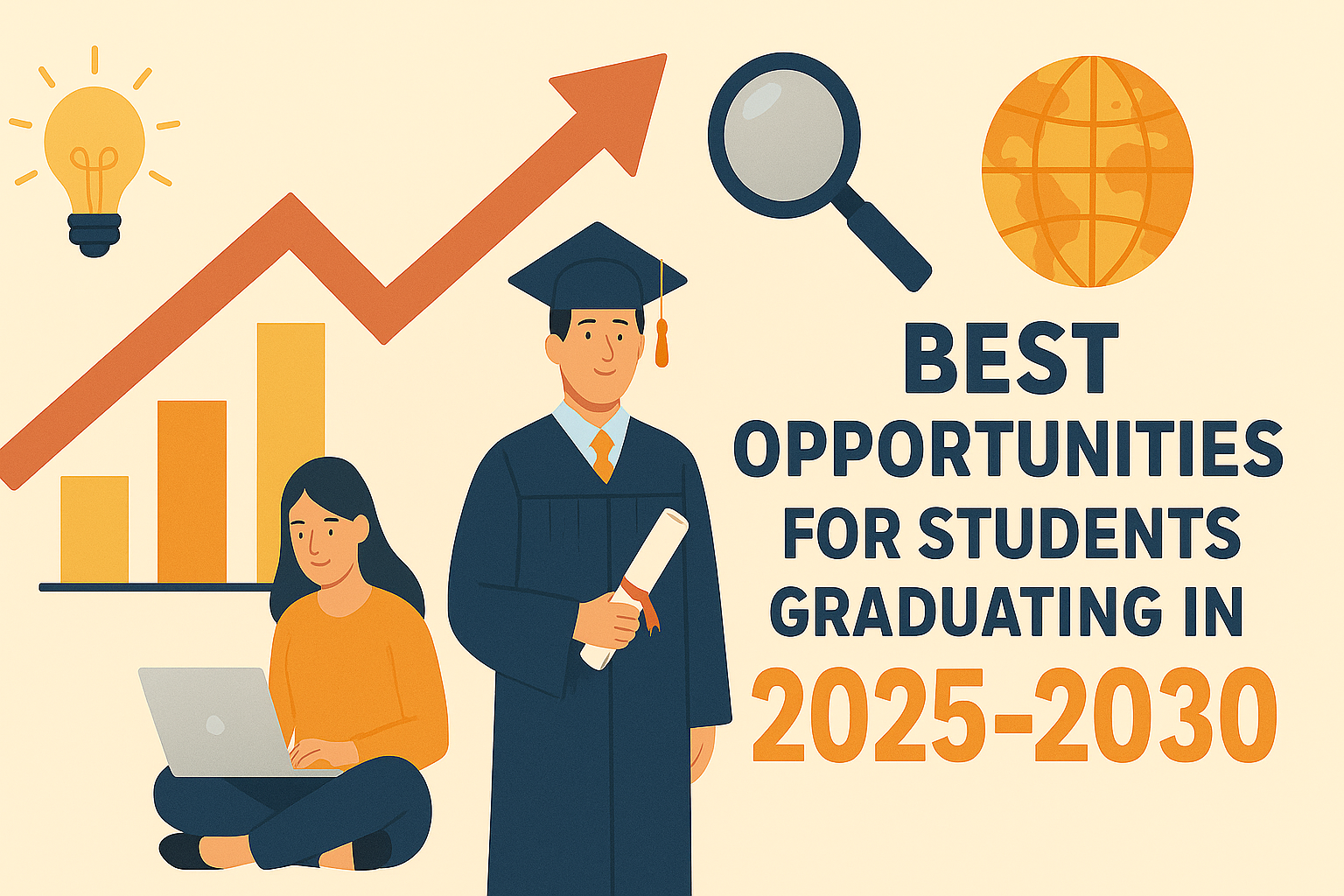
Introduction to the Best Opportunities for Students
Technology is evolving, so does the future of education with the best opportunities for students graduating in 2025-2030 to dominate various industrial sectors.
The conventional classroom model though available, undergoing changes to let students think and learn via various new ways like AI-powered personalized learning methods.
Modern edtech tools have also played their part in making education more accessible, inclusive, and engaging for the students.
So, what we are going to see in the upcoming five years…? Let’s dive into the major edtech trends that will sketch the vision 2047 of developed India.
Best Opportunities for Students Graduating in 2025-2030
1. AI-Driven Personalized Learning Systems
Artificial Intelligence is already one of the major edtech trends that is transforming education, and now the focus will be on the AI-powered personalized learning.
Tools like Microsoft Reading and Squirrel AI are assisting teachers to give top AI education to analyze students’ strengths, weaknesses, and preferred learning habits.
These tools then further customize programs to improve students’ performances in patterns they like. Using such tools ensures that no student in the class lags in studies
2. Gamification for Deep Learning Engagement
In the upcoming five years, gamification will be one of the biggest contributors to keep students engaged in studies.
Be ready to think beyond mere badges and leaderboards to complex game mechanics including role-playing, group challenges, and adaptive missions to teach typical topics.
The latest example can be found in some educational apps where a group of students explored ancient world map through VR gears and solved problems related to sustainability and rapid environmental changes.
3. The Hybrid Learning Revolution
Post pandemic, hybrid model of learning became one of the major edtech trends and it will continue to grow high till 2030. As it perfectly blends conventional classroom learning with learn from home, upcoming years will witness the integration of Augmented Reality with it.
Moreover, by 2030, hybrid education will be the new normal and will combine teacher-to-students interaction with AI-powered digital apps to enhance flexibility and accessibility while enabling students to learn and revise on their own pace.
Therefore, in coming years, education will not be affected by geographical limitations in any circumstances.
4. Focus on Life Skills and Future Ready Competencies
After the emergence of top AI education, upcoming jobs will altogether require skills like critical thinking, problem solving, and collaborative emotional intelligence.
For these future jobs (some of them are upcoming), new courses have been introduced to prepare students for these careers even after completing school or college education.
There is an important fact that by 2030, 85% of high paying careers will require skills that are yet to be trained to the students. (From the report of World Economic Forum)
5. Blockchain Technology for Secure Credentialing
Blockchain will be the next tool to securely integrate academic records. For instance, it will not only prevent fraud but also simplify process for institutions.
6. Emphasis on Social-Emotional Learning (SEL) Tools
The need for edtech tools to go beyond academics is evident. It can even keep an eye on students’ social and mental awareness skills.
In upcoming five years, we will witness AI-driven SEL tools providing personalized interpersonal growth strategies. Additionally, we will have plans to cope with sudden mood swings, and foster resilience.
Moreover, integration of gamification will educate empathy, teamwork, and conflict resolution by placing students in scenarios via digital simulations.
The Road is Not Easy: Challenges Awaiting in the Next 5 Years
A huge potential waiting for major edtech trends, but they will also face several challenges that can hinder its growth. Let’s talk about some of them:
- Access and Affordability: These both are not the terms but the biggest hurdles to democratize technology in developing and under-developing nations.
- Adoption Challenges: Educators resist changes because they fear they will be left behind by technology. Moreover, upgradation requires training, which proves to be costly.
- Skill Gap Among Educators: Resistance brings another bigger challenge, i.e. lack of skills among educators. As a matter of fact, students can never become techno friendly if their teachers are not one.
- High Drop-Rates in Online Education: Although online education has given the opportunity to students sitting far away from the city to study, the biggest concern is to limit the drop-out rate which is even more than offline education.
Conclusion: Your Best Opportunities Are Waiting
As we know, the edtech industry will provide the best opportunities for students graduating in 2025-2030. For instance, until now, the influence of edtech tools extend far beyond conventional classrooms. Additionally, in the coming five years it will extend to hybrid ecosystem, mental health support, AI-driven practical, etc.
It is important to adopt edtech trends and achieve extended technology engagement to enhance skillset and move forward. Although, the time will tell how much progress we will attain before entering in the 4th decade of 21st century.
